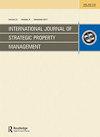Role of Innovation Management Practices in Enhancing Firm Agility and Adaptability during Times of Crisis in Turkey
IF 1.7
4区 管理学
Q3 MANAGEMENT
引用次数: 0
Abstract
Purpose: The study sought to investigate the role of innovation management practices in enhancing firm agility and adaptability during times of crisis in Turkey. Materials and Methods: The study adopted a desktop methodology. Desk research refers to secondary data or that which can be collected without fieldwork. Desk research is basically involved in collecting data from existing resources hence it is often considered a low cost technique as compared to field research, as the main cost is involved in executive’s time, telephone charges and directories. Thus, the study relied on already published studies, reports and statistics. This secondary data was easily accessed through the online journals and library Findings: The study found that Turkish firms embracing innovation management practices exhibited enhanced agility and adaptability during crises. These practices included nurturing an innovative culture, investing in research and development, and embracing digital solutions. Leadership commitment and external collaborations were identified as crucial enablers. Additionally, the research underscored the importance of tailoring strategies to Turkey's specific context to effectively bolster firm resilience during challenging times. Unique Contribution to Theory, Practice and Policy: The study recommends Turkish firms should formulate agile innovation strategies that emphasize flexibility and rapid response to changing market conditions. This involves regularly assessing customer needs, market trends, and emerging technologies. By continuously adapting their innovation strategies, firms can remain responsive and agile during crises. This recommendation contributes to theory by emphasizing the integration of agility principles into innovation management frameworks, highlighting the need for dynamic and iterative approaches. Encourage cross-functional collaboration within organizations to facilitate innovation.土耳其危机时期创新管理实践在提高企业敏捷性和适应性中的作用
目的:本研究旨在探讨创新管理实践在土耳其危机时期提高企业敏捷性和适应性方面的作用。
材料与方法:本研究采用桌面方法学。案头研究指的是二手数据或不需要实地调查就能收集到的数据。案头调查基本上涉及从现有资源中收集数据,因此,与实地调查相比,案头调查通常被认为是一种成本较低的技术,因为主要费用是行政人员的时间、电话费和通讯录。因此,这项研究依赖于已经发表的研究、报告和统计数据。这些辅助数据很容易通过在线期刊和图书馆获得
研究发现:采用创新管理实践的土耳其公司在危机期间表现出更高的敏捷性和适应性。这些实践包括培育创新文化、投资研发以及采用数字解决方案。领导承诺和外部合作被认为是关键的推动因素。此外,该研究强调了根据土耳其的具体情况制定战略的重要性,以便在充满挑战的时期有效增强公司的应变能力。对理论、实践和政策的独特贡献:该研究建议土耳其公司应制定敏捷创新战略,强调灵活性和对不断变化的市场条件的快速反应。这包括定期评估客户需求、市场趋势和新兴技术。通过不断调整创新战略,企业可以在危机期间保持反应敏捷。该建议通过强调将敏捷性原则集成到创新管理框架中,强调对动态和迭代方法的需求,从而对理论做出贡献。鼓励组织内部的跨职能协作以促进创新。
本文章由计算机程序翻译,如有差异,请以英文原文为准。
求助全文
约1分钟内获得全文
求助全文
来源期刊
CiteScore
4.00
自引率
18.50%
发文量
23
审稿时长
15 weeks
期刊介绍:
International Journal of Strategic Property Management is a peer-reviewed, interdisciplinary journal which publishes original research papers. The journal provides a forum for discussion and debate relating to all areas of strategic property management. Topics include, but are not limited to, the following: asset management, facilities management, property policy, budgeting and financial controls, enhancing residential property value, marketing and leasing, risk management, real estate valuation and investment, innovations in residential management, housing finance, sustainability and housing development, applications, etc.

 求助内容:
求助内容: 应助结果提醒方式:
应助结果提醒方式:


